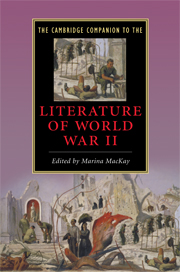5 - War journalism in English
from Part I - Anglo-American texts and contexts
Published online by Cambridge University Press: 28 May 2009
Summary
In the spring of 1941, the American reporter Robert St. John was not so much in the field as running through many fields. He left Belgrade, fleeing south across country and then by sea, joining British troops as they retreated through Greece to escape the rapidly advancing German army. On the way, he noted the sights produced by mechanized war: the dying soldier eviscerated but still talking, the maimed girl, and the ambulance driver who was burnt alive. On arrival in Cairo, St. John expressed disillusionment with the necessary twisting of events into a narrative suitable for transmission to London: “we were just leeches, reporters trying to suck headlines out of all this death and suffering.” But then, upon seeing the military censors, it became clear that little of his material would be passed: a few sections were acceptable but the ambulance driver would have to have been “shot” - a more decorous way to die. This brief episode typifies some key practical difficulties of war journalism in the Second World War: the physical problems of reporting from a fluid battlefield; the exposure to violent death; and the pressure of censorship. Yet it also shows the level at which some correspondents were aware that they were constructing narratives - literary works - burdened by the concomitant questions of authority and authenticity. These complexities have made it harder in recent years to dismiss such journalism as valuable only for its immediate importance as reportage and its subsequent historical usefulness. A full definition of Second World War literature should include the writing that was produced in closest proximity to the action; and such writing, as I shall demonstrate in this chapter, covers a plethora of possibilities in terms of form and content.
- Type
- Chapter
- Information
- Publisher: Cambridge University PressPrint publication year: 2009
- 1
- Cited by



